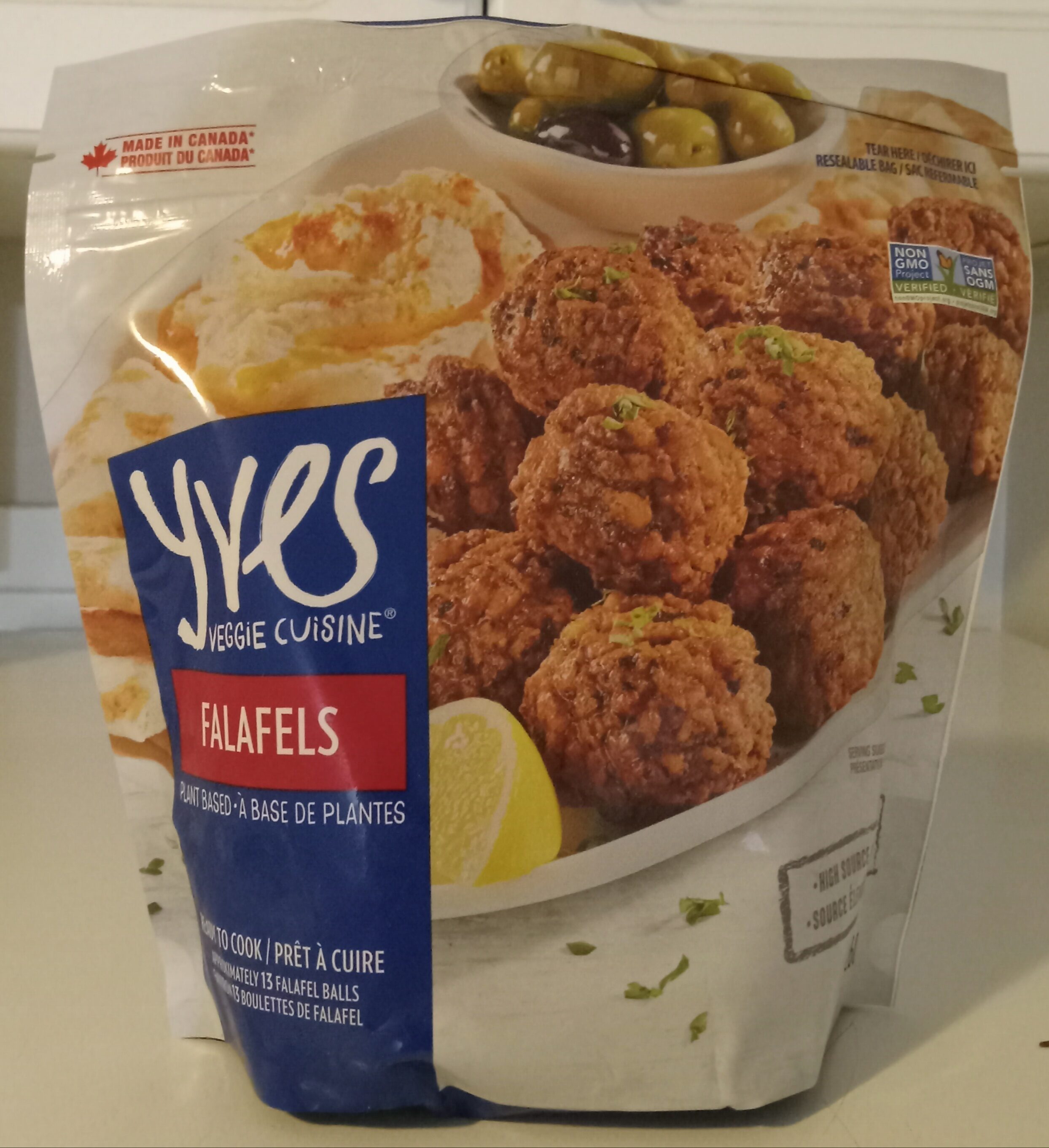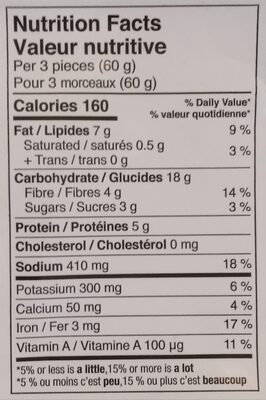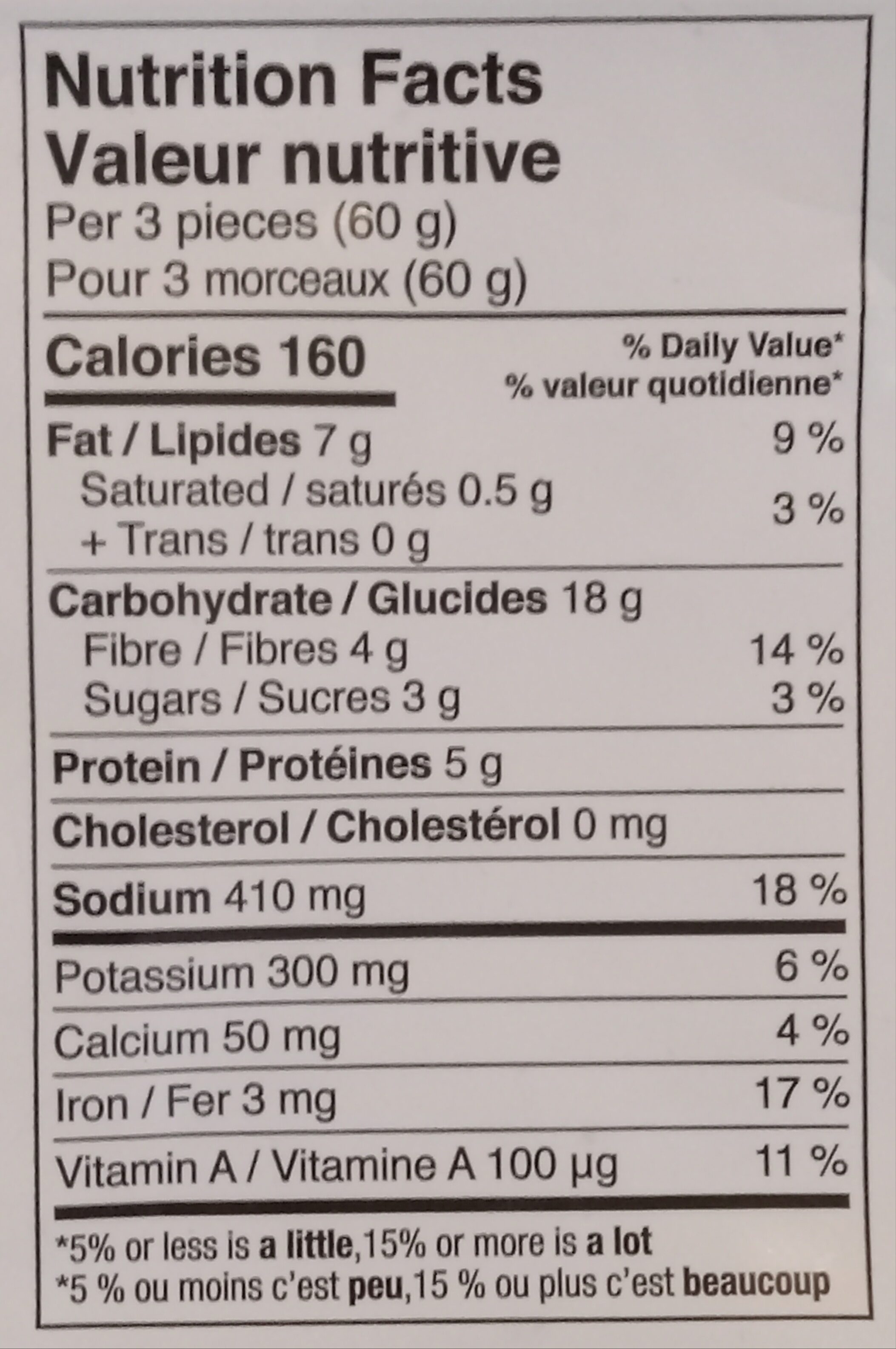Help us make food transparency the norm!
As a non-profit organization, we depend on your donations to continue informing consumers around the world about what they eat.
The food revolution starts with you!
Falafels - Yves - 260 g
Falafels - Yves - 260 g
This product page is not complete. You can help to complete it by editing it and adding more data from the photos we have, or by taking more photos using the app for Android or iPhone/iPad. Thank you!
×
Barcode: 0060822010014 (EAN / EAN-13) 060822010014 (UPC / UPC-A)
Quantity: 260 g
Brands: Yves
Categories: Meat alternatives, Vegetarian balls, Falafels
Labels, certifications, awards:
No gluten, Kosher, No artificial flavors, No artificial preservatives, No GMOs, Source of fibre, GFCO Gluten Free, High fibres, No Trans Fat, Non GMO project, Orthodox Union Kosher

Manufacturing or processing places: Canada
Stores: Real Canadian Superstore
Countries where sold: Canada
Matching with your preferences
Health
Ingredients
-
14 ingredients
Chickpeas, Onions, Canola oil, Parsley, Carrots, SPices, Vinegar, Garlic, Modified cellulose, Salt, Sodium bicarbonate, Carrageenan, Caramel, Lime juice concentrate.Allergens: Mustard, Soybeans
Food processing
-
Ultra processed foods
Elements that indicate the product is in the 4 - Ultra processed food and drink products group:
- Additive: E407 - Carrageenan
- Additive: E460 - Cellulose
Food products are classified into 4 groups according to their degree of processing:
- Unprocessed or minimally processed foods
- Processed culinary ingredients
- Processed foods
- Ultra processed foods
The determination of the group is based on the category of the product and on the ingredients it contains.
Additives
-
E407 - Carrageenan
Carrageenan (E407), derived from red seaweed, is widely employed in the food industry as a gelling, thickening, and stabilizing agent, notably in dairy and meat products.
It can exist in various forms, each imparting distinct textural properties to food.
However, its degraded form, often referred to as poligeenan, has raised health concerns due to its potential inflammatory effects and its classification as a possible human carcinogen (Group 2B) by the International Agency for Research on Cancer (IARC).
Nevertheless, food-grade carrageenan has been deemed safe by various regulatory bodies when consumed in amounts typically found in food.
-
E460 - Cellulose
Cellulose: Cellulose is an organic compound with the formula -C6H10O5-n, a polysaccharide consisting of a linear chain of several hundred to many thousands of β-1→4- linked D-glucose units. Cellulose is an important structural component of the primary cell wall of green plants, many forms of algae and the oomycetes. Some species of bacteria secrete it to form biofilms. Cellulose is the most abundant organic polymer on Earth. The cellulose content of cotton fiber is 90%, that of wood is 40–50%, and that of dried hemp is approximately 57%.Cellulose is mainly used to produce paperboard and paper. Smaller quantities are converted into a wide variety of derivative products such as cellophane and rayon. Conversion of cellulose from energy crops into biofuels such as cellulosic ethanol is under development as a renewable fuel source. Cellulose for industrial use is mainly obtained from wood pulp and cotton.Some animals, particularly ruminants and termites, can digest cellulose with the help of symbiotic micro-organisms that live in their guts, such as Trichonympha. In human nutrition, cellulose is a non-digestible constituent of insoluble dietary fiber, acting as a hydrophilic bulking agent for feces and potentially aiding in defecation.Source: Wikipedia
-
E500 - Sodium carbonates
Sodium carbonates (E500) are compounds commonly used in food preparation as leavening agents, helping baked goods rise by releasing carbon dioxide when they interact with acids.
Often found in baking soda, they regulate the pH of food, preventing it from becoming too acidic or too alkaline. In the culinary world, sodium carbonates can also enhance the texture and structure of foods, such as noodles, by modifying the gluten network.
Generally recognized as safe, sodium carbonates are non-toxic when consumed in typical amounts found in food.
-
E500ii - Sodium hydrogen carbonate
Sodium hydrogen carbonate, also known as E500ii, is a food additive commonly used as a leavening agent.
When added to recipes, it releases carbon dioxide gas upon exposure to heat or acids, causing dough to rise and resulting in a light, fluffy texture in baked goods.
It is generally recognized as safe (GRAS) by regulatory authorities when used in appropriate quantities and poses no significant health risks when consumed in typical food applications.
Ingredients analysis
-
Palm oil free
No ingredients containing palm oil detected
Unrecognized ingredients: Modified-celluloseSome ingredients could not be recognized.
We need your help!
You can help us recognize more ingredients and better analyze the list of ingredients for this product and others:
- Edit this product page to correct spelling mistakes in the ingredients list, and/or to remove ingredients in other languages and sentences that are not related to the ingredients.
- Add new entries, synonyms or translations to our multilingual lists of ingredients, ingredient processing methods, and labels.
If you would like to help, join the #ingredients channel on our Slack discussion space and/or learn about ingredients analysis on our wiki. Thank you!
-
Vegan status unknown
Unrecognized ingredients: Modified-celluloseSome ingredients could not be recognized.
We need your help!
You can help us recognize more ingredients and better analyze the list of ingredients for this product and others:
- Edit this product page to correct spelling mistakes in the ingredients list, and/or to remove ingredients in other languages and sentences that are not related to the ingredients.
- Add new entries, synonyms or translations to our multilingual lists of ingredients, ingredient processing methods, and labels.
If you would like to help, join the #ingredients channel on our Slack discussion space and/or learn about ingredients analysis on our wiki. Thank you!
-
Vegetarian status unknown
Unrecognized ingredients: Modified-celluloseSome ingredients could not be recognized.
We need your help!
You can help us recognize more ingredients and better analyze the list of ingredients for this product and others:
- Edit this product page to correct spelling mistakes in the ingredients list, and/or to remove ingredients in other languages and sentences that are not related to the ingredients.
- Add new entries, synonyms or translations to our multilingual lists of ingredients, ingredient processing methods, and labels.
If you would like to help, join the #ingredients channel on our Slack discussion space and/or learn about ingredients analysis on our wiki. Thank you!
-
Details of the analysis of the ingredients
We need your help!
Some ingredients could not be recognized.
We need your help!
You can help us recognize more ingredients and better analyze the list of ingredients for this product and others:
- Edit this product page to correct spelling mistakes in the ingredients list, and/or to remove ingredients in other languages and sentences that are not related to the ingredients.
- Add new entries, synonyms or translations to our multilingual lists of ingredients, ingredient processing methods, and labels.
If you would like to help, join the #ingredients channel on our Slack discussion space and/or learn about ingredients analysis on our wiki. Thank you!
en: Chickpeas, Onions, Canola oil, Parsley, Carrots, SPices, Vinegar, Garlic, Modified cellulose, Salt, Sodium bicarbonate, Carrageenan, Caramel, Lime juice concentrate- Chickpeas -> en:chickpea - vegan: yes - vegetarian: yes - ciqual_food_code: 20532 - percent_min: 7.14285714285714 - percent_max: 100
- Onions -> en:onion - vegan: yes - vegetarian: yes - ciqual_food_code: 20034 - percent_min: 0 - percent_max: 50
- Canola oil -> en:canola-oil - vegan: yes - vegetarian: yes - from_palm_oil: no - percent_min: 0 - percent_max: 33.3333333333333
- Parsley -> en:parsley - vegan: yes - vegetarian: yes - ciqual_proxy_food_code: 11014 - percent_min: 0 - percent_max: 25
- Carrots -> en:carrot - vegan: yes - vegetarian: yes - ciqual_food_code: 20009 - percent_min: 0 - percent_max: 20
- SPices -> en:spice - vegan: yes - vegetarian: yes - percent_min: 0 - percent_max: 16.6666666666667
- Vinegar -> en:vinegar - vegan: yes - vegetarian: yes - ciqual_food_code: 11018 - percent_min: 0 - percent_max: 14.2857142857143
- Garlic -> en:garlic - vegan: yes - vegetarian: yes - ciqual_food_code: 11000 - percent_min: 0 - percent_max: 12.5
- Modified cellulose -> en:modified-cellulose - percent_min: 0 - percent_max: 11.1111111111111
- Salt -> en:salt - vegan: yes - vegetarian: yes - ciqual_food_code: 11058 - percent_min: 0 - percent_max: 1.71
- Sodium bicarbonate -> en:e500ii - vegan: yes - vegetarian: yes - percent_min: 0 - percent_max: 1.71
- Carrageenan -> en:e407 - vegan: yes - vegetarian: yes - percent_min: 0 - percent_max: 1.71
- Caramel -> en:e150 - vegan: yes - vegetarian: yes - percent_min: 0 - percent_max: 1.71
- Lime juice concentrate -> en:lime-juice-concentrate - vegan: yes - vegetarian: yes - ciqual_food_code: 13067 - percent_min: 0 - percent_max: 1.71
Nutrition
-
Very good nutritional quality
⚠ ️Warning: the amount of fruits, vegetables and nuts is not specified on the label, it was estimated from the list of ingredients: 97This product is not considered a beverage for the calculation of the Nutri-Score.
Positive points: 15
- Proteins: 5 / 5 (value: 8.33, rounded value: 8.33)
- Fiber: 5 / 5 (value: 6.67, rounded value: 6.67)
- Fruits, vegetables, nuts, and colza/walnut/olive oils: 5 / 5 (value: 97.4722726004464, rounded value: 97.5)
Negative points: 11
- Energy: 3 / 10 (value: 1120, rounded value: 1120)
- Sugars: 1 / 10 (value: 5, rounded value: 5)
- Saturated fat: 0 / 10 (value: 0.833, rounded value: 0.8)
- Sodium: 7 / 10 (value: 683, rounded value: 683)
The points for proteins are counted because the points for the fruits, vegetables, nuts and colza/walnut/olive oils are at the maximum.
Nutritional score: (11 - 15)
Nutri-Score:
-
Nutrient levels
-
Fat in moderate quantity (11.7%)
What you need to know- A high consumption of fat, especially saturated fats, can raise cholesterol, which increases the risk of heart diseases.
Recommendation: Limit the consumption of fat and saturated fat- Choose products with lower fat and saturated fat content.
-
Saturated fat in low quantity (0.833%)
What you need to know- A high consumption of fat, especially saturated fats, can raise cholesterol, which increases the risk of heart diseases.
Recommendation: Limit the consumption of fat and saturated fat- Choose products with lower fat and saturated fat content.
-
Sugars in moderate quantity (5%)
What you need to know- A high consumption of sugar can cause weight gain and tooth decay. It also augments the risk of type 2 diabetes and cardio-vascular diseases.
Recommendation: Limit the consumption of sugar and sugary drinks- Sugary drinks (such as sodas, fruit beverages, and fruit juices and nectars) should be limited as much as possible (no more than 1 glass a day).
- Choose products with lower sugar content and reduce the consumption of products with added sugars.
-
Salt in high quantity (1.71%)
What you need to know- A high consumption of salt (or sodium) can cause raised blood pressure, which can increase the risk of heart disease and stroke.
- Many people who have high blood pressure do not know it, as there are often no symptoms.
- Most people consume too much salt (on average 9 to 12 grams per day), around twice the recommended maximum level of intake.
Recommendation: Limit the consumption of salt and salted food- Reduce the quantity of salt used when cooking, and don't salt again at the table.
- Limit the consumption of salty snacks and choose products with lower salt content.
-
-
Nutrition facts
Nutrition facts As sold
for 100 g / 100 mlAs sold
per serving (60 g)Compared to: Falafels Energy 1,120 kj
(267 kcal)669 kj
(160 kcal)+13% Fat 11.7 g 7 g +8% Saturated fat 0.833 g 0.5 g -32% Trans fat 0 g 0 g Cholesterol 0 mg 0 mg Carbohydrates 30 g 18 g +36% Sugars 5 g 3 g +81% Fiber 6.67 g 4 g -8% Proteins 8.33 g 5 g -1% Salt 1.71 g 1.025 g +34% Vitamin A 167 µg 100 µg Potassium 500 mg 300 mg Calcium 83.3 mg 50 mg -14% Iron 5 mg 3 mg +24% Fruits‚ vegetables‚ nuts and rapeseed‚ walnut and olive oils (estimate from ingredients list analysis) 97.472 % 97.472 %
Environment
-
Eco-Score B - Low environmental impact
⚠ ️Select a country in order to include the full impact of transportation.The Eco-Score is an experimental score that summarizes the environmental impacts of food products.→ The Eco-Score was initially developped for France and it is being extended to other European countries. The Eco-Score formula is subject to change as it is regularly improved to make it more precise and better suited to each country.Life cycle analysis
-
Average impact of products of the same category: A (Score: 94/100)
Category: Falafel
Category: Falafel
- PEF environmental score: 0.15 (the lower the score, the lower the impact)
- including impact on climate change: 0.84 kg CO2 eq/kg of product
Stage Impact Agriculture
43.9 %Processing
20.9 %Packaging
10.6 %Transportation
14.1 %Distribution
6.1 %Consumption
4.4 %
Bonuses and maluses
-
Missing origins of ingredients information
Malus: -5
⚠ ️ The origins of the ingredients of this product are not indicated.
If they are indicated on the packaging, you can modify the product sheet and add them.
If you are the manufacturer of this product, you can send us the information with our free platform for producers.
-
Missing packaging information for this product
Malus: -15
⚠ ️ The information about the packaging of this product is not filled in.⚠ ️ For a more precise calculation of the Eco-Score, you can modify the product page and add them.
If you are the manufacturer of this product, you can send us the information with our free platform for producers.
Eco-Score for this product
-
Impact for this product: B (Score: 74/100)
Product: Falafels - Yves - 260 g
Life cycle analysis score: 94
Sum of bonuses and maluses: -20
Final score: 74/100
-
Carbon footprint
-
Equal to driving 0.4 km in a petrol car
84 g CO² per 100g of product
The carbon emission figure comes from ADEME's Agribalyse database, for the category: Falafel (Source: ADEME Agribalyse Database)
Stage Impact Agriculture
23.3 %Processing
18.5 %Packaging
22.2 %Transportation
29.4 %Distribution
4.5 %Consumption
2.1 %
Packaging
-
Missing packaging information for this product
⚠ ️ The information about the packaging of this product is not filled in.Take a photo of the recycling information Take a photo of the recycling information
Transportation
-
Origins of ingredients
Missing origins of ingredients information
⚠ ️ The origins of the ingredients of this product are not indicated.
If they are indicated on the packaging, you can modify the product sheet and add them.
If you are the manufacturer of this product, you can send us the information with our free platform for producers.Add the origins of ingredients for this product Add the origins of ingredients for this product
Report a problem
-
Incomplete or incorrect information?
Category, labels, ingredients, allergens, nutritional information, photos etc.
If the information does not match the information on the packaging, please complete or correct it. Open Food Facts is a collaborative database, and every contribution is useful for all.
Data sources
Product added on by kiliweb
Last edit of product page on by binzyboi.
Product page also edited by yuka.D7lNYIeRHc0oJ8H1wK0LwGHhE8i8XN5JHEw_og, yuka.sY2b0xO6T85zoF3NwEKvln5pT-Xd_ir9Kjvjm3OH1smeK4L1YOBX35HdbKo.











